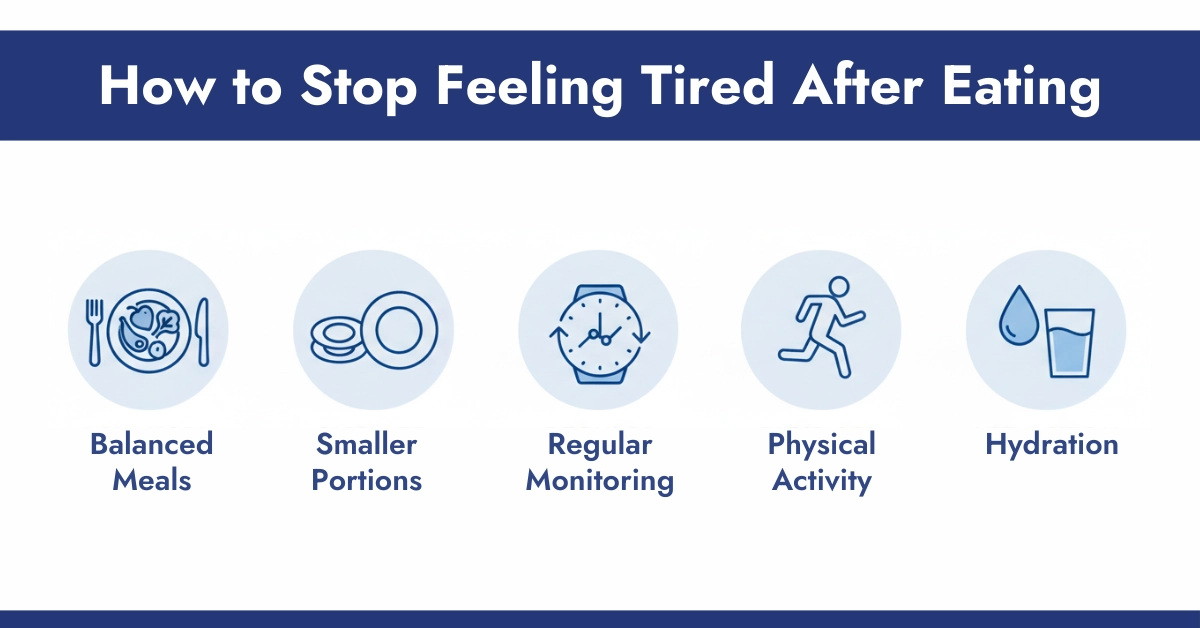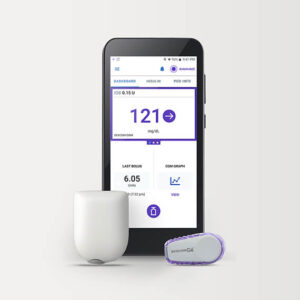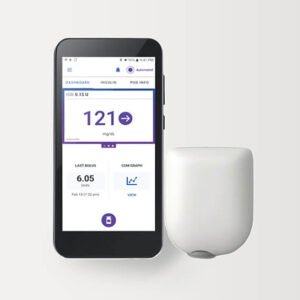Table of content
- Introduction: Why Sugar Makes You Tired
- What Happens to Your Body After Eating Sugar?
- Blood Sugar Spikes and and Post Meal Fatigue
- How High Sugar Affects Energy and Sleep?
- Diabetes and Fatigue: How High Sugar Affects Energy
- Other Factors Contributing to Fatigue in Diabetes
- Glucose Spikes Symptoms and Fatigue
- Practical Tips to Stop Feeling Tired After Eating
- Conclusion
Introduction: Why Sugar Makes You Tired
Feeling sleepy after eating is a common experience, but for individuals with diabetes or those struggling with high blood sugar, this fatigue can be more pronounced and persistent. The question, “Does high sugar make you sleepy?” is not just anecdotal; scientific studies and clinical observations confirm that elevated glucose levels can indeed cause lethargy, drowsiness, and fatigue. In this blog, we’ll explore why high sugar makes you sleepy, how diabetes impacts energy levels, and what steps you can take to maintain alertness throughout the day.
What Happens to Your Body After Eating Sugar?
Many people with diabetes report feeling extremely tired after meals, a condition often referred to as “postprandial fatigue.” High glucose levels after eating can disrupt the body’s normal energy production. When blood sugar spikes, insulin is released to help cells absorb glucose, but in cases of insulin resistance or type 2 diabetes, this process is less efficient, leading to high blood sugar and feelings of exhaustion.
The Science Behind Sleeping After Eating
When we eat, our bodies start the digestive process by breaking down the food into smaller molecules that the bloodstream can absorb. Digestive enzymes and other chemicals in our stomach and intestines facilitate this process. Once the nutrients are absorbed into our bloodstream, they are transported to our cells, which are used for energy and to repair and maintain our body tissues.
Sleep is a crucial time for our bodies to repair and restore themselves. During sleep, our body releases hormones that promote tissue growth and repair, and our immune system also becomes more active to fight off infections and other threats.
However, when we sleep immediately after eating, our bodies must divide their resources between digestion and repair, which can disrupt both processes.
Several factors can influence the effects of sleeping after eating. The type of food we eat can impact how quickly it is digested and absorbed. For example, foods high in fat and protein take longer to digest than carbohydrates, slowing the digestive process.
Additionally, our activity level after eating can affect how well our bodies can digest food. Light activities like walking can help stimulate digestion and reduce discomfort while lying down or sleeping can slow down the process and lead to discomfort.
Blood Sugar Spikes and and Post Meal Fatigue
Blood Sugar Spikes
Consuming sugary or carb-heavy meals can cause sudden spikes in blood sugar, followed by a rapid drop, often called a “sugar crash.” This fluctuation reduces energy levels, leaving you feeling sleepy or sluggish. Managing portion sizes and balancing meals with protein or fiber can help stabilize energy throughout the day.
Post-Meal Fatigue
After eating, your body diverts energy to digestion, which can naturally make you feel a bit tired. When high-sugar foods are involved, this effect is amplified due to rapid changes in blood glucose. People with diabetes may notice stronger fatigue as their bodies struggle to balance sugar levels efficiently.
Medical sources, including the American Diabetes Association, note that excessive drowsiness after eating is a common symptom in people with poorly controlled diabetes. Symptoms can include feeling sleepy after eating sugar, lethargy after meals, and excessive fatigue after eating carbs.
How High Sugar Affects Energy and Sleep?
Mechanism Behind the Post-meal Sleepiness
Several mechanisms contribute to post-meal sleepiness, especially in those with high blood sugar:
- Blood Sugar Spikes and Drops: After consuming carbohydrate-rich foods, glucose levels rise sharply. For individuals with insulin resistance, the body struggles to manage this spike, leading to fluctuations in energy.
- Insulin Response: Elevated insulin levels can induce a drop in blood sugar, causing sugar crash and resulting in fatigue and sleepiness.
- Gut Hormones and Digestion: Hormones like cholecystokinin (CCK) and glucagon-like peptide-1 (GLP-1) are released during digestion, signaling the body to divert energy toward the digestive process, often leaving you feeling drowsy.
- Dehydration and Electrolyte Imbalance: High glucose levels can lead to increased urination and dehydration, which contributes to fatigue.
Sugar and Sleepiness Connection
The connection between elevated glucose levels and fatigue involves several interconnected mechanisms:
- Rapid Glucose Absorption: Sugary foods are digested quickly, causing blood sugar to spike.
- Reactive Hypoglycemia: In response, insulin may overshoot, dropping glucose levels and triggering fatigue.
- Neurotransmitter Effects: Foods high in sugar stimulate serotonin and melatonin production, contributing to drowsiness. For example, chocolate can increase melatonin, causing temporary sleepiness.
Dehydration plays another crucial role in this tiredness equation. Elevated blood sugar causes your kidneys to work overtime, filtering excess glucose from your blood and expelling it through urine. This increased urination leads to fluid loss, and even mild dehydration can cause significant fatigue, difficulty concentrating, and decreased physical performance.
Diabetes and Fatigue: How High Sugar Affects Energy
Fatigue is a hallmark symptom of diabetes. Whether it is type 2 diabetes extreme fatigue or type 2 diabetes tired all the time, the underlying causes often include:
- High Blood Sugar (Hyperglycemia): Persistent elevated glucose levels can impair energy production in cells.
- Diabetes and Obesity: Excess weight increases insulin resistance, making energy metabolism less efficient.
- Insulin Resistance: Cells fail to absorb glucose properly, leading to low energy despite high blood sugar.
- Diabetes-Related Sleep Disorders: Conditions such as sleep apnea, common in diabetes, exacerbate daytime fatigue.
Symptoms related to diabetes fatigue include purple fingertips diabetes, diabetes exhaustion after eating, and blood sugar and exhaustion.
Other Factors Contributing to Fatigue in Diabetes
- Sleep Disorders: Conditions like insomnia or sleep apnea worsen daytime sleepiness.
- Nutrient Deficiencies: Low magnesium, vitamin D, or B12 can contribute to fatigue.
- Comorbid Conditions: Thyroid disorders, heart disease, and obesity can exacerbate tiredness.
- Psychological Stress: Chronic stress increases cortisol, affecting blood sugar and energy.
Understanding the root cause of fatigue helps tailor treatment for type 2 diabetes extreme fatigue or general diabetes lack of energy.
Glucose Spikes Symptoms and Fatigue
High glucose can produce multiple symptoms alongside fatigue. These include:
- Feeling lethargic after eating
- Excessive drowsiness after meals
- Difficulty concentrating
- Persistent thirst and urination
- Feeling extremely tired after eating
Monitoring glucose spikes can help identify patterns in fatigue after eating and improve management strategies.
Practical Tips to Stop Feeling Tired After Eating
If you often experience post-meal sleepiness, consider these strategies:
- Balanced Meals: Include protein, fiber, and healthy fats to slow glucose absorption.
- Smaller Portions: Eating large meals can intensify blood sugar spikes.
- Regular Monitoring: Use a glucometer or continuous glucose monitor like Libre 3 Plus or Dexcom G7 sensor to track postprandial levels.
- Physical Activity: Light movement after meals, such as walking, improves glucose uptake and energy.
- Hydration: Drink water to prevent dehydration-related fatigue.
Sources like Mayo Clinic emphasize lifestyle adjustments and glucose monitoring to manage diabetes fatigue effectively.

Conclusion
High blood sugar can indeed make you sleepy. The connection between glucose levels and fatigue involves multiple physiological pathways, including insulin resistance, postprandial glucose spikes, and hormonal responses. People with diabetes often experience feeling sleepy after eating sugar, type 2 diabetes extreme fatigue, and blood sugar and fatigue, which can affect daily life.
Managing diet, monitoring glucose, staying active, and seeking professional guidance are essential steps to reduce high sugar sleepy episodes. By understanding the link between high blood sugar and fatigue, individuals can take control of their energy levels and improve overall health.
Frequently Asked Questions
Why does high blood sugar make you sleepy?
Consuming sugar causes insulin release. Excess insulin drops blood sugar levels, leading to lethargy and fatigue, disrupting sleep patterns.
Is falling asleep after eating a sign of diabetes?
Yes, if one falls asleep immediately after eating, the body may be less sensitive to insulin, leading to increased blood sugar levels.
What is the science behind sleeping after eating?
Sleeping after eating disrupts the body’s processes, dividing resources between digestion and repair. Type of food and activity level influence effects.
What are the harmless habit benefits of sleeping after eating?
Improved digestion, reduced stress levels, better sleep quality, weight loss benefits by regulating appetite hormones, and improving overall well-being.
What are the risks of sleeping after eating for diabetes?
Sleeping after eating increases blood sugar levels, leading to insulin resistance and Type 2 diabetes development.
How to stop feeling tired with diabetes?
To combat tiredness with diabetes, maintain stable blood sugar through balanced meals, regular exercise like walking 30 minutes daily, and 7-9 hours of quality sleep; address anemia or B12 deficiency with your doctor, as these exacerbate fatigue.
How does high blood sugar affect sleep?
High blood sugar disrupts sleep by causing frequent nighttime urination (nocturia), dehydration leading to dry mouth or headaches, and restlessness; it also promotes inflammation, reducing deep sleep quality over time.
Do diabetics sleep a lot?
Diabetics often sleep more due to fatigue from blood sugar instability, but poor sleep quality from nocturia or apnea is common; aim for 7-9 hours of restorative sleep to better manage glucose.
What 7 fruits should diabetics avoid?
Diabetics should avoid or limit high-GI fruits like mangoes, grapes, pineapple, watermelon, bananas, cherries, and dried fruits due to rapid sugar spikes; portion control and pairing with protein help mitigate effects.
Can high blood sugar cause vomiting?
Yes, high blood sugar can cause vomiting, especially in diabetic ketoacidosis (DKA), where ketones build up, irritating the stomach; it’s a medical emergency with abdominal pain and rapid breathing—seek immediate care.
Can diabetes cause diarrhea?
Yes, diabetes can cause diarrhea through nerve damage (gastroparesis) slowing digestion, high sugar feeding gut bacteria, or medications like metformin; it’s often chronic and nocturnal, requiring dietary adjustments and medical review.
Can too much sugar make you tired?
Yes, too much sugar causes tiredness via blood sugar crashes after spikes, dehydration from frequent urination, and inflammation; it overloads the system, leaving you fatigued as energy isn’t efficiently delivered to cells.
Does pre-diabetes make you tired?
Yes, prediabetes can cause tiredness due to early insulin resistance impairing energy use, leading to subtle fatigue or lethargy despite rest; it’s often overlooked but improves with lifestyle changes like exercise and balanced diet.
How does the body respond when blood sugar is too high?
When blood sugar is too high, the body signals the pancreas for more insulin, but in diabetes, this fails, leading to osmotic diuresis (excess urination to excrete glucose), dehydration, and potential ketone buildup causing acidosis.
Can dehydration cause high blood sugar?
Yes, dehydration concentrates blood sugar by reducing plasma volume, making levels appear higher; in diabetes, it worsens hyperglycemia as kidneys work harder to filter glucose—drink water proactively to help dilute and excrete excess sugar.
What are signs your blood sugar is low?
Signs of low blood sugar (hypoglycemia) include shakiness, sweating, rapid heartbeat, hunger, irritability, dizziness, or confusion; severe cases may cause seizures or unconsciousness—treat immediately with 15g fast-acting carbs like glucose tabs.










Write a comment
Your email address will not be published. All fields are required